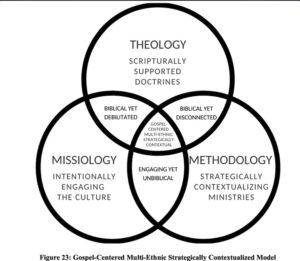“Culture eats strategy for breakfast.” – Peter Drucker.
You may be able to rightly divide the word of God. You may lead people, teams, and organizations. You may care well for those in your congregation. However, without understanding your surrounding context, it will be difficult for you to connect with your people.
Bob Bumgarner, guest on the Replant Bootcamp podcast this week, said, “Listening to the field will lead you to the future.” This statement emphasizes the importance of cultural exegesis. Cultural exegesis is paying close attention to the surrounding culture around you and being able to use that to minister wherever God has placed you.
If you are involved in a Replant or Revitalization of any kind, cultural exegesis will be critical to consider, and there are several tools to help you in that effort.
Here are a few ways to be more intentional about your surrounding context, ranked from least to most important.
Study your demographic
In episodes 86 and 89 of the podcast, Josh Dryer helped us understand demographics’ vital role in your ministry. When I began working with churches at our association, we used a resource called Mission Insite to provide a detailed report of demographics in our area. Using those reports, I created customized demographics for all our churches and began speaking on Sunday evening services, doing a presentation called “Who’s My Neighbor?”
While “demographics” sounds boring to some people, this presentation helped our churches understand what the most significant ministry needs in their area. Part of cultural exegesis involves thinking missiologically. If you use demographics to pull income information, average age, ethnicity, and family structures, ask yourself, “Does my church look like my community?” Demographics paint a picture with broad strokes to help us recognize how God wants to use our churches most effectively.
Be in your community.
 Another way to “Listen to the Field” is by being active in your community. As a Replant or Revitalization pastor, you will do yourself a favor by being as active in the community as possible. Some of the most helpful conversations I have been in have been at the coffee shop, a football game, or a city council meeting.
Another way to “Listen to the Field” is by being active in your community. As a Replant or Revitalization pastor, you will do yourself a favor by being as active in the community as possible. Some of the most helpful conversations I have been in have been at the coffee shop, a football game, or a city council meeting.
Please forgive me for quoting a Johnny Cash song instead of a theological book. Still, in the song “No Earthly Good,” Johnny says, “The gospel ain’t gospel until it is spread, but how can you share it where you’ve got your head; There are hands that reach out for a hand if you would, so heavenly minded, you’re no earthly good.” In the podcast, Bob said, “You can’t exegete your community from your desk.” Don’t forget that as a shepherd, you need to smell like the sheep. Be where your people are, and use your insight from the surrounding community to help you minister to their needs.
Listen to your people.
The best way to learn about your community and surrounding culture is to listen to your people.
What do they fear? What do they value? What is essential for your church in this community?
After doing a “Who’s My Neighbor” presentation, one of our churches recognized the need to focus outwardly on their low-income neighborhoods. So, they consulted an agency to do food drop-offs and started doing a bi-monthly food giveaway. On the second Saturday of those months, I drive through their town and see cars lined up for miles. With each bag of food, they give away tracts and invitations for people to visit their church. It all started with a pastor asking his congregation, “What do you think are major needs in our community?”
Don’t forget that those congregation members have likely been in your town longer than you and will be there long after you are gone. As they listen to you preach the word, listen to their needs and let them lead their engagement in the community.
Be led by the Holy Spirit.
Mentioned in this episode was Henry Blackaby’s classic work Experiencing God. In the book, Blackaby suggests that we should look around, see where God is at work, and then join him in that work. Blackaby would say that we need to be led by the Spirit if we are seeking to engage our communities where we are.
The Holy Spirit’s work involves prompting, convicting, and leading. If we are walking by the Spirit, expect to think of prompted ways you can understand and minister to your context. Karl Bart once said we should “Have the Bible in one hand and a newspaper in another.” Use scripture to exegete your culture. One example given was in Acts 6, where there was a need that arose among the apostles. The widows were being overlooked in the daily distribution. The word of God continued to spread when the apostles addressed the need, listened to the people, and met the community’s needs (Acts 6:1-7).
My encouragement to church leaders is that we would not be tone-deaf to the culture but would instead be good students of the culture. While the gospel’s message never changes, ministry opportunities sometimes change around us. If we study the people and listen to them while we are in the community, the Holy Spirit will lead us to minister effectively for the glory of God.


 Another way to “Listen to the Field” is by being active in your community. As a Replant or Revitalization pastor, you will do yourself a favor by being as active in the community as possible. Some of the most helpful conversations I have been in have been at the coffee shop, a football game, or a city council meeting.
Another way to “Listen to the Field” is by being active in your community. As a Replant or Revitalization pastor, you will do yourself a favor by being as active in the community as possible. Some of the most helpful conversations I have been in have been at the coffee shop, a football game, or a city council meeting. 
